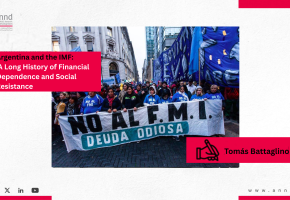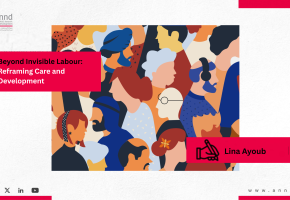
May 16, 2017
Laborious work at minimum subsistence - Article featuring the findings of the Arab Watch Report in Egypt - By Salma Hussein - Originally Published in Alshorouk news
He is a “tuk tuk” driver in his mid-30s working from 10am to 9pm, seven days a week, on a small cart he bought eight years ago. He paid for this cart using a loan and after receiving his share of the remuneration that was earned during his work with his father. When the vehicle use to crash, which has happened very often during the last three years, he had to spend days at home in order to repair it. This means that his family had, for these days, nothing to eat except for what was offered by some family members and neighbors. This is why he felt obliged to work daily at one of the construction sites that have spread over the agricultural lands around him. Contrary to what many may think, this man represents the majority of the workers not only in Egypt but also in many Arab countries.
The circumstances and jobs are various, however, the majority of Arab countries, from the east to the west, including Bahrain, Syria, Morocco, Egypt, Iraq, Lebanon, and Sudan and others witness a common phenomenon called informal labor: housekeepers – whether domestic or foreign- street hawkers, agricultural and construction workers, or even educated workers in the private or public sector and also those who belong to the middle class. This definition is featured in the recently published Arab Watch Report on "Informal Labor" developed by the Arab NGO Network for Development.
If we were to ask ourselves about the common factors among the various Arab countries in the twenty-first century, the answer should not be “the Arabic language” but rather the existence of a majority of young people and adults working discontinuously, without contracts, health insurance or social protection such as pensions or unemployment insurance. These people really constitute a great majority in our societies. The aforementioned report detailing the cases of thirteen Arab countries analyzes the official data in large samples to conclude that six out of ten people in Egypt work informally and that this type of work is prevalent in all Arab countries. The question now is: is this a good or a bad thing?
Arab governments believe that pursuing a non-decent or improper job is better than not working at all. "The Arab societies did not witness the industrial revolution that was experienced in Europe in the nineteenth century which had developed the labor ties between the business owners who manage the means of production and the workers who are paid for their time and efforts. Then, according to the report, many issues have arisen at the level of providing these workers with their different rights in association, demonstrations, strikes, health, and pensions, etc. Though, these gains came in the Arab countries with the era of liberation from colonialism, accompanied by state-building and industrialization through government investment. Thus, the role of organizing labor relations was mainly assigned to the government.
The Slavery of the 21st Century:
In the era of neoliberal policies, private investments have failed to compensate for the state's withdrawal from investments and job creation, and the occurrence of rural-urban migration. According to the report, this is also what happened in all developing countries around the world. Hence, unemployment has increased in various Arab countries, at a time when most of them have seen a flow in youth population. Then the global economic shocks occurred, followed by people’s uprisings to make it worse. In addition to unemployment, employers have been drastically exploiting those who are working for them.
So when we see the colorful ads about elegant young people working at a private company, we should not lose sight of the background of the scene. One reality is: Infinite rows of red brick houses on the roadsides are the source of the phenomenon, these random buildings that include random workers. Therefore, those who we see on ads only represent one out of ten workers.
While labor law still covers a minority of privileged people who were lucky enough to receive an employment opportunity with a long-term contract, the majority of labor kept working as they “do not enjoying the luxury of unemployment without insurance”. However, this cannot but be labeled as fragile intermittent work. As a result, and according to the International Labor Organization (ILO), nearly half of the workers in a country like Egypt remain poor. They work constantly but cannot support themselves or their families enough to get a decent life.
The Uber Company and its drivers:
Sponsored by the government and encouraged by the World Bank, the labor market was divided into formal and informal. However, this is socially and economically unsustainable, as "workers in the informal economy are not recognized, and are not registered or organized or protected by labor and social protection legislation and thus cannot practice or defend their fundamental rights" as mentioned by the regional author of the Arab Watch Report, Mr. Samir Aita. Therefore, the ILO found that the disadvantages of informal labor are greater than the advantages and it has worked on creating rules and recommendations that would improve the status of informal workers, which has been ignored by most of Arab states.
Look at a company like Karim or Uber that is expanding and spreading across the world and more importantly creating more informal workers. On the one hand, the company is growing and earning billions of profits, as a result of opening international markets and encouraging investments. It creates jobs for hundreds of thousands of people, but not through employment. These drivers, according to the law, are working for themselves, without health insurance or pension benefits, and do not have the right to join the syndicate of taxi drivers, or to form their own syndicate to defend and express their interests. Even more, they are oppressed by the authorities although their work is not a crime. Therefore, over time, their income is projected to decline, and the driver's duration of work cannot be considered as permanent. There is infinity of examples about that but are there solutions?
The only alternative is for these workers to organize themselves in groups and allow them to express themselves and their interests, as we have seen in European History and in the Indian and Latin American experience, which were monitored by the report monitors. This requires the decision-makers to support the workers in the private sector. Unlike the prevailing discourse in the government, these informal workers prefer to work for themselves as the data indicate that most of them work for others who take advantage of their need to work, and do not give them what they deserve in return. Thus, the remedy suggested by the states is to provide them with soft loans to start their own businesses, which will only affect the minority of the exploited. The solution, in turn, remains to improve the working conditions for labor and support the income redistribution that is expected to increase the level of growth.
"If the share of the poorest 20 percent or the middle income increases by 1 percent, the GDP increases by at least 0.4 percentage points, meaning that the poor and the middle class stimulate the economy by spending every additional dollar they receive, while the rich may be saving them in foreign banks without generating any domestic interest and thus deprive the economy from it potential benefits." This quote is the result of a study by the International Monetary Fund which includes lessons learned from the shocks that hit during the 21st century.
How do revolutions start?
The Arab revolutions followed by protest movements around the world were not only the result of unemployment and labor’s frustration. They also exploded in one country after another because of a 27-year-old man working informally in a marginalized region in Tunisia. "No development has been known to provide him with a job that ensures his human dignity; he also was not a paid worker, not even an agricultural worker like his father. He was a “business owner” (or an entrepreneur) and this sheds the light on the importance of his role and the role of youth in economic growth. His despair and suicide came as a result of oppression; precisely just because he is an informal worker, and that he must also be subject to the law, which ended with the removal of his source of livelihood. So, it clearly seems that addressing this challenge is at the heart of treating development issues in Arab countries", as the report editor concludes. We cannot turn a blind eye on the core determinants of the uprising.
Salma Hussein: First Researcher at the Egyptian Initiative for Personal Rights and a Journalist specialized in economics since 17 years
Recent publications
Dec 22, 2025

